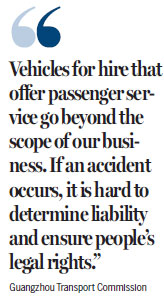Nothing's special for Guangzhou taxi apps
Updated: 2015-01-20 09:54
By Zhou Mo in Shenzhen(HK Edition)
|
|||||||||
Ban on private or rental cars may hit popular luxury segment
Hail-a-cab mobile application businesses, including Hong Kong's most popular, Kuaidi Dache, will find the going tougher in Guangzhou as the mainland city has banned them from providing "special car services".
The service refers to a business where private cars or vehicles owned by car rental companies are used by suppliers. Some taxi-hailing apps, including Didi Dache and Kuaidi Dache, have introduced such business to their service in an effort to grab a share from the middle- and high-end market.
In Beijing and Shanghai, privately owned vehicles are banned from being used in special car services, but there are no clear regulations concerning the legality of using vehicles owned by car rental companies. In Guangzhou, however, the use of either kind of vehicle is ruled as illegal operation.
According to the Guangzhou Transport Commission, vehicles for hire that offer passenger service go beyond the scope of their business. If an accident occurs, it is hard to determine liability and ensure people's legal rights, the commission said.
However, some scholars and experts have questioned the need for the official ban. Dong Baotian, a professor at the School of Traffic and Transportation at Beijing Jiaotong University, said there would be little risk for rental vehicles in running passenger business if both vehicle and driver have the required legal license or qualification.
Cao Zhiwei, a Standing Committee member of the Chinese People's Political Consultative Conference Guangzhou Municipal Committee, however, sees the move in a negative light. "It's unreasonable," he said.
As Cao sees it, safety risks have been lowered as rental vehicles have GPS positioning system and insurance, and, moreover, all orders are made through the Internet.
A staff member from a car-hailing app firm that specializes in providing "special car services" told China Daily that the business of his company in Guangzhou has been severely affected by the ban. "Car drivers don't dare to do business after the ban was put in place," he said.
Those at Kuaidi Dache, meanwhile, expressed hope that the government could give more space to the market in order to promote healthy development of the industry.
Compared with standard taxi-hailing charges, fees for the special car service are 20-50 percent higher. But then customers are able to enjoy higher-end vehicles and better service.
"User experience of special car service is excellent," said Chen Ping, a Shenzhen businessman who called the service for airport pickup. "An Audi A6L came to pick me up. The driver was enthusiastic. Small details, like providing water in the car, made me happy."
Although special car service providers insist that they do not pose a threat to the taxi industry as the two types of service target different customer groups, yet, in Shenyang, Qingdao and Nanjing, taxi drivers have staged strikes to resist the "invasion" of the new service.
Therefore, protecting the rights of the taxi industry, while promoting innovative development of the sector, becomes an important issue. And Dong suggests putting in place a service priority system.
"For example, (a rule can be implemented that) car-calling orders can only be transferred to the 'special car' platform when the passenger receives no answer from the taxi platform after calling a certain number of times. But to achieve this, all relevant sides need to step up efforts to create a new operating environment," Dong said.
sally@chinadaily.com.cn

|
Customer-tailored services have shed new light on the mainland's taxi industry. Asia News photo |
(HK Edition 01/20/2015 page9)
